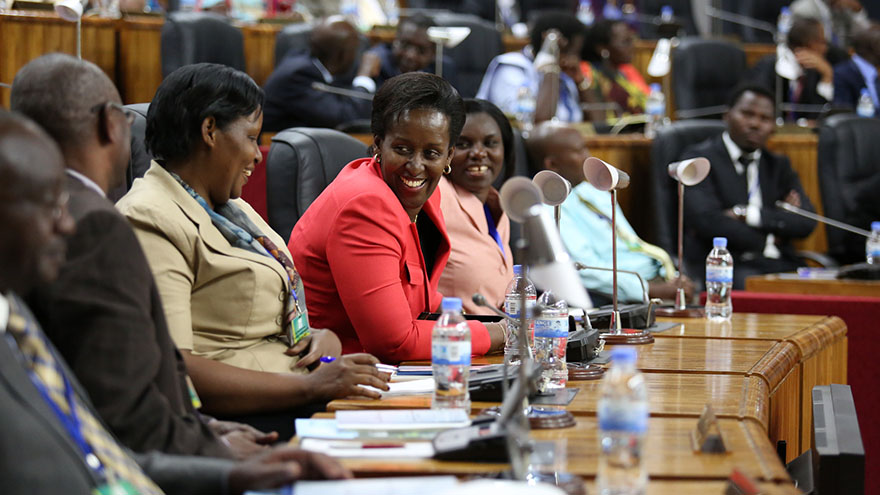Where are the women? Some lessons for Pakistan from Rwanda
Estimated reading time: 3 Minutes

In Rwanda there is a saying. "The woman is the heart of the house, so if your heart is working well the whole body is also to benefit."
Many people in Pakistan may only relate Rwanda with the 2004 Hollywood flick, Hotel Rwanda, which tells the compassionate tale of a hotel manager saving some 1200 Tutsi minority people by sheltering in his Hotel during one of the worst Genocide of the Century. The genocide culminated between the Rwanda’ s Hutus and Tutsi tribes resulting into systematic extermination of almost 500,000 to 1,000,00 people.
[caption id="attachment_8012" align="alignnone" width="880"]
 A photo from Umushyikirano - National Dialogue Council 2013, Rwanda Parliament. Source Flickr Creative Commons[/caption]
A photo from Umushyikirano - National Dialogue Council 2013, Rwanda Parliament. Source Flickr Creative Commons[/caption]Rwanda, however, has become much more than a mere typical war torn African country, it has become a country led, run and managed by women, with more than 63% of women in the national Parliament, Rwanda tops the female MPs list in the world, ironically Pakistan stands at the 69th standing on the same index of women parliamentarians. Whereas among some of the prominent western countries, female representation is surprisingly low (for example France 26.2%, United Kingdom 29.4% and United States 19.4%).
Rwanda experienced civil war, hatred and bloodshed, but they arose as a nation as a phoenix out of ashes and drafted their Constitution of peace, whose preamble states:
“We, the People of Rwanda, in the wake of the genocide that was organized and supervised by unworthy leaders and other perpetrators and that decimated more than a million sons and daughters of Rwanda;
Resolved to fight the ideology of genocide and all its manifestations and to eradicate ethnic, regional and any other form of divisions;
Determined to fight dictatorship by putting in place democratic institutions and leaders freely elected by ourselves…”
The Constitution has been a colossal humanitarian achievement in aftermath of the hate literature of “Hutu Ten Commandment” (refer our hate literature castrating Shias, Ahmadis, minorities, transsexuals, so on and so forth). The rise of women in the political and government positions was not just the consequence of loss of men during the civil war but an conscious effort by the Rwandan women to include themselves into the rebuilding of their country and nation. When the Rwandan genocide ended it left Rwanda with an over whelming women population, women of Rwanda however were like the rest of the women of the third world, that is, a home maker, a child bearer and an unpaid worker with no right to property inheritance.
It is said that “war start in the minds of men”, note that it says men and not women. Women are more compassionate and humane; this quality has long been considered inappropriate for the bloody corridors of power. Still, these women stood up to the task and despite the fact that no miracle of mosses occurred, in the last five years, one million Rwandans have emerged from poverty, Hutu and Tutsis have started to live in peace though lots more to be done but they have started the journey. Positive peace can exist and women as the half of the population of the world can play a vital role in the effort, as a Rwandan woman narrates: “having to sit next to the wife of the man who killed your husband or the women whose partner is living in exile after murdering your brother” is not easy yet these women have learnt the skills of co-existence.
We have some lessons to draw from Rwanda, women all over the world including Pakistan are mostly considered either a window dressing in the enlightened first world or enlightened moderation symbol for the aid seeking third world countries. Pakistan is facing an internal war; its societal fabric is in tatters with sectarian, ethnic and gender hatred on the rise. We are although short of a mass catastrophe like genocide, but we are still brutally violated.
Women rights movements in Pakistan if not more, certainly lack directions. Maybe another angle to peace can be initiated with women’s empowerment in the public sphere, by elevating the status of women to the beacons of peace. Any movement focusing on peace by women just even at the household level will have the deep lasting effects, it can change the mind sets, alter the cultural aspects of violence in the society. Women are to change themselves, elevate themselves, no one will come to the aid of the weak if weak is not willing to be strong.
Quratulain Fatima is studying for an MPP at the Blavatnik School of Government. See her profile and find her on Twitter.
